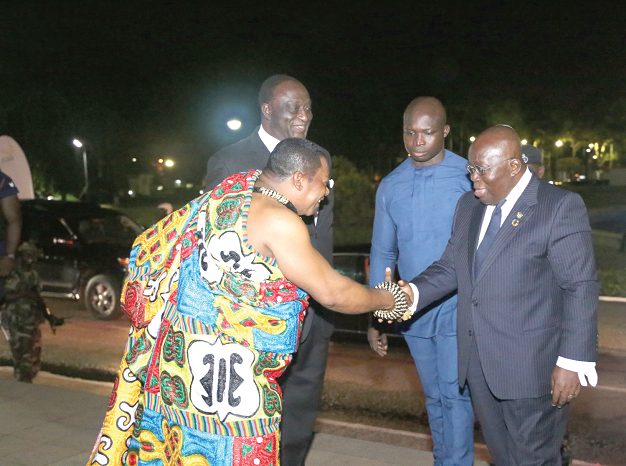
Reduce lending rates - Businesses tell commercial bank
Business are mounting pressure on commercial banks to reduce their lending rates to help them access cheaper sources of funds to expand their operations.
The President of the chamber, Nana Appiagyei Dankawoso I, addressing the maiden Chamber Business Awards last Saturday, said reduction in the interest rates would help serve as a catalyst for businesses to expand their operations.
“We have also observed the government’s commitment to bringing down interest rates by reducing its borrowing from the domestic banking system as well as a drastic reduction in the policy rate and the treasury bill rates,” he said.
However, he said, lending rates remained stubbornly high and sticky between 30 per cent and 35 per cent which directly undermined business competitiveness in the country.
Industrial transformation
Addressing the gathering, President Nana Addo Dankwa Akufo-Addo announced that the government would establish an Integrated Bauxite and Aluminium Development Authority to spearhead the exploitation of the country’s strategic resources.
He said the exploitation of the country’s bauxite and iron ore deposits “will give a considerable fillip to our industrial development, as will also be the case for the exploitation of our iron ore deposits”.
Touching on the several elements to the Agenda of Industrial Transformation, the President said the government had put in place a stimulus package to revive financially distressed but economically viable businesses.
Monetary policy
President Akufo-Addo said the government had achieved strong macroeconomic growth over the last 10 months, as key economic indicators have improved significantly.
He explained that the government was working on the fundamentals of the economy because it believed that an improved macroeconomy was required for stimulating the investments needed for the significant expansion and growth in the country.
“The government has begun putting in place the measures that will improve the living conditions of the Ghanaian people,” he said those measures have resulted in a stronger macroeconomy.
“The interventions, initiated by the government, over the last 10 months, have ensured that the fiscal deficit, which stood at 9.5 per cent at the end of 2016, has been reduced to 6.3 per cent this year.
Inflation, within the same period, has declined from 15.4 per cent to 11.6 per cent. Our economy has grown from 3.3 per cent last year, the lowest in 22 years, to 7.9 per cent this year,” he said.
He mentioned that interest rates were declining, and the country was presently witnessing a more stable currency as against the major international currencies.
“The Monetary Policy Rate by the Bank of Ghana (BoG) declined by 450 basis points from 25.5 per cent in January to 21 per cent in September. That has contributed to the downward trend of interest rates, with a sharp decline in the 91-day and 182-day Treasury Bill Rates,” he said.
Change formula
The Chief Executive Officer (CEO) of the Private Enterprise Foundation (PEF), Nana Osei-Bonsu, told the Daily Graphic in an interview that the private sector was hopeful the central bank would soon change the formula the universal banks used to calculate their rates.
“There is a formula the banks use to calculate their interest rates and this formula is not in direct correlation with the policy rate of the BoG. Therefore, until the formula is changed, the banks will not react swiftly to the drop in policy rate,” he said.